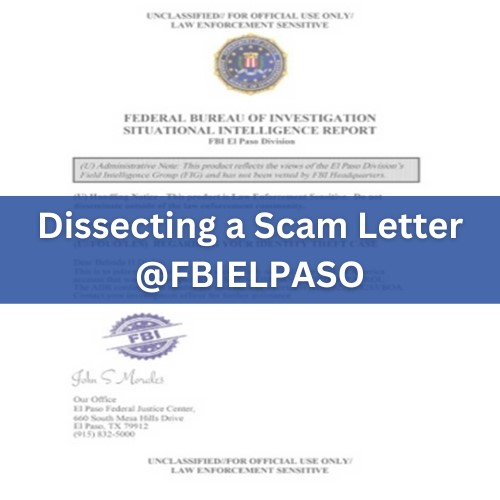In 2016, over 22,000 FBI employees were victims of “doxing”. Their contact information to include job titles, employee phone numbers, states of residences, email addresses, and other information was released to the public. Over the years we have seen a more targeted retaliation towards FBI leadership, which includes individuals such as me. Scammers have used our information successfully in government impersonation scams.
Let’s look at an example of how scammers are targeting unwitting individuals in our communities to steal money from them using their and my information and position. The above letter started going out with my name earlier this month, just two weeks after I was announced as the Special Agent in Charge for the FBI El Paso field office. As of today, my office has received eight reports of victims located in the Midwest and the Northeast. One victim reported losing $35,000 to solve her son’s identity theft case.
For many of you, you have not seen an official FBI document and if you see a classification on a document, you think it’s a legitimate document. Let me point out a few things that will help you spot the scam.
Red Flags:
- FBI letters to the public will not have a classification on them. You will not see UNCLASSIFIED. You will not see “FOR OFFICIAL USE ONLY/LAW ENFORCEMENT SENSITIVE”. Although these are valid classification and handling caveats, the FBI will not include them on a letter going to a member of the community.
- The Administrative Note explains how the FBI El Paso Division’s Field Intelligence Group has a part in this letter. This group of primarily Intelligence Analysts would not be sending you a letter about an investigative matter.
- The letter is labeled as a “SITUATIONAL INTELLIGENCE REPORT”. Although this is a valid form, it is only used internally for intelligence gathered in investigations, it will not be used to communicate with the public.
- The letter mentions “US Customs and Border Patrol”, the correct name is “US Customs and Border Protection.”
- The letter mentions “bank of america”, the correct name would be “Bank of America.”
- The FBI will not use a blue stamp that says “FBI” right above my name in a letter.
- The “signature” is not mine; it is a font type used to look like a signature.
- We would not put “Our Office” in the signature line. The office information is correct to lead you to believe I sent this out to you.
This letter is used twofold: add legitimacy to their government impersonation and financial impersonation scam and used in multiple angles to include cryptocurrency to make a person believe they are a victim of identity theft.
If you receive this letter, throw it away. If emailed to you, delete it. Don’t believe the initial phone calls where they provide this letter or use my name. If they demand cryptocurrency to fix the Identity Theft situation, hang up it’s a scam.
A true victim of identity theft should contact their financial institutions directly on the telephone numbers on the banking statement or back of your debit card, they should contact the three credit bureaus to put a freeze on their accounts so no new lines of credit can be taken out in their name. The Federal Trade Commission has valuable information at IdentityTheft.gov to help report and develop a plan to recover from identity theft.
John Morales
Special Agent in Charge, FBI El Paso


With El Paso so close to the Mexican border and Mexico in the throws of revolutionary struggle during the early 1900s, southwest Texas became a key focus of the Bureau soon after its founding in 1908. As the FBI heads into its second century, the El Paso Division remains committed to protecting the people and defending the nation while upholding the rule of law and the civil liberties of all.
